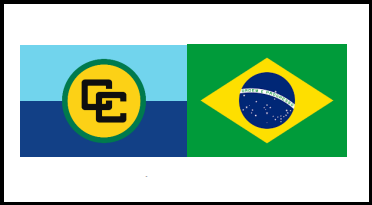
What Migjonela is trying to achieve is more trade between the Caribbean countries and Brazil.
There are only 7 Foreign Embassies and Consulates of Caribbean Countries based in the territory of Brazil. Barbados, Cuba, Dominican Republic, Guyana, Haiti, Jamaica and Trinidad and Tobago.
The other caribbean countries should not only wake up and smell the coffee, they should buy it as well. Brazil is responsible for about a third of all coffee, making Brazil by far the world’s largest producer.
Over the last few years, Brazil has been steadily expanding its economic and diplomatic presence in the Caribbean. In part, this is fuelled by the country’s strong economic performance and continued political stability, which has capitulated Brazil’s standing as an emerging powerhouse in the world.
The past two decades have seen an explosive surge in trade and investments among the world’s developing nations. The Caribbean must aggressively diversify its economic relationships. Increasing trade and strengthening trading links with non-traditional partners are the foremost economic imperatives. While, Europe and North America, especially the United States, will likely remain the Caribbean’s most important trading partners, it is the currently Brazil which can hold greatest trading opportunities.
Brazil’s economic ascendancy offers the Caribbean new possibilities for greater intra-regional trade, as well as a gateway to South America’s largest trading bloc, the Southern Common Market, commonly referred to as MERCOSUL. The upside growth potential of an expanded Brazil-Caribbean trading partnership is significant. Brazil’s potential for further economic advancement is immense.
Brazil has one of the largest reserves of natural resources in the world, and also has one of the most important and advanced industrial sectors among the developing countries.
Brazil has long been an aspirant world power, but its economic maladies have encumbered its global ambitions. However, with the reforms taking the economy forward, the country is well-positioned to assert its desired role as a leading international player.
Brazil’s Caribbean courtship has been evolving despite the apparently strong ethno-cultural similarities with the Caribbean, Brazil traditionally had consigned a low saliency to the region.
The Caribbean rarely figured in the spectrum of Brazilian foreign or economic policy interests. This lack of interest is in part owing to the legacies of colonial rivalry between the Portuguese, Spanish, and British empires in the region, which conditioned intra-regional isolation, mistrust, and linguistic barriers.
Now economics, more than history is driving Brazil’s foreign policy outlook. Brazil has been able to flex its muscles as a rising power, stepping-up its role as a key Latin American state to exert leadership throughout the hemisphere, most notably in the Caribbean.
The Caribbean is laboring to diversify its export import base to boost global competitiveness in traditional and emerging industries.
Brazil offers the potential of an alternative market to the region’s long established, but eroding preferential trading partnerships.
Brazil clearly has something to offer the Caribbean. The prospect for this emergent bilateral relationship to radically transform the Caribbean’s trade and economic position within the hemisphere exists. However, if the Caribbean is to reap the full benefits of this trading relationship, it must push to secure equal footing with Brazil in negotiating the parameters of their bilateral trade and investment engagement.
This is no easy task for the Caribbean as a set of small-size economies; its bargaining power to advance trade priorities is asymmetric in comparison to Brazil. The region, even in the context of CARICOM, must boost its market productivity and export import promotion measures to ensure the development of mutually productive trading links so that the investment traffic is not all oneway.
The current terms of trade indices highlight Brazil’s favor, with most of the trade value representing export from Brazil. The country has emerged as a top import partner for the Caribbean.
In the economic realm, Brazil-Caribbean trade is in its embryonic stages, but bears watching, as the scale of trade between Brazil and the Caribbean is growing, but not quick enough.
The Caribbean could also further exploit Brazils advantages in health services and health tourism facilities.
With the support of Brazil, CARICOM-MERCOSUL relations are steadily developing. Brazil represents a potential market of 215 million people for Caribbean goods and services, and a certainty source of cheaper imports.
Caribbean countries need to consider Brazil as a viable market for both goods and services. Language, culture, and market requirements should not be insurmountable barriers to trade.
For the Caribbean, closer ties with Brazil will be largely beneficial to the region’s development necessities for export market diversification.
The character of this new Brazil-Caribbean relationship is still unfolding, but warrants close following. A strong and mutually beneficial partnership between Brazil and the Caribbean could potentially bridge the hemispheric divide in the region.
We Migjonela is showing and proving to the Caribbean communities that there are opportunities if Caribbean private sectors and governments are prepared to conduct business exploration.
Migjonela can source products and services in Brazil for caribbean private sectors and governments. We will provide high quality logistics services thereafter involving all stages from purchase to procurement.